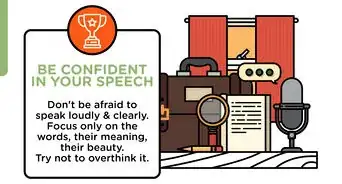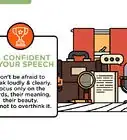This article was co-authored by Patrick Muñoz. Patrick is an internationally recognized Voice & Speech Coach, focusing on public speaking, vocal power, accent and dialects, accent reduction, voiceover, acting and speech therapy. He has worked with clients such as Penelope Cruz, Eva Longoria, and Roselyn Sanchez. He was voted LA's Favorite Voice and Dialect Coach by BACKSTAGE, is the voice and speech coach for Disney and Turner Classic Movies, and is a member of Voice and Speech Trainers Association.
This article has been viewed 57,526 times.
Effective speaking is based on your subject matter and how you enunciate and articulate. Effective speaking skills are indeed useful in converting clear useful thoughts or ideas to spoken words. The words can be nutritious foods for the listeners' mind and heart. A good speaker (not only a professional speaker) is also a good thinker! A skillful fluent tongue is magnetic, powerful, and inspirational. Gain friends, develop charisma, and attract success through speaking. There is power in words!
Steps
Boosting Your Oral Communication Skills
-
1Be knowledgeable about language. You are or you've been in school. The first step to being a good speaker is to be knowledgeable about your language (presumably, English, in this case). Study English, especially grammar, so that it will be natural for your tongue to speak English. To be fluent and accurate, understand the structure of the language, as well as its proper usage. You can't be good in English if you don't know about it.
- If you are a student, pay attention to your English class.
- Surround yourself with English. Read English books, and watch English movies.
-
2Use proper and smooth articulation and pronunciation. A clear and correct pronunciation is appreciated and easily understood. However, bad pronunciation is like an annoying monotonous sound of a machine. Familiarize yourself with phonetics. Phonetics is concerned with the production of speech sounds, and their representation in writing.
- Moreover, in articulating, freely move your mouth; jaw, tongue, and cheeks, to produce sounds.[1] Don't just speak with a small mouth. If a sound is a stretched sound, stretch your mouth. If the sound is short, keep it short.[2]
- Aspirate sounds that are meant to be.
- In English, a letter can have two or more sounds.
- Practice some tongue twisters. Give your mouth exercise.[3]
Advertisement -
3Make use of inflection. Don't worry if you speak too high or too low sometimes. Effective speaking is also like singing. If the sound is not varying of high tone and low tone, it will sound dull, boring! Intonation helps you show your feelings about what you speak.[4] Thus, you can have emotional relationship with your listener or audience. Intonation indicates you are sure about what you say, if you are asking, angry, commanding, suggesting, and so forth.[5]
- Try to speak with variations of pitch. As you speak, discourse in normal tone, then shift to high tone for some emphasis, and low tone for a serious tone that can make your listener listen more attentively. You must not stick to one tone. But, make sure that you use intonation appropriately to match what you are saying. Use of inflection makes your talk interesting, climactic. Again, we have three pitches in speaking, the middle or normal, high, and low. There is no such perfect pitch in speaking. Play with your pitches when speaking.
-
4Speed up and slow down. The rate, or how fast or slow you speak, is also important. Avoid speaking with one tone and one rhythm. Aside from inflection, your rate in speaking makes you sound enthusiastic.
- Speaking too fast, but still understandably, will make you sound alive. Your listeners will focus more to what you say, because the fluctuation in speed gets their heed, and they will try to catch your words. Speaking too slowly makes you sound serious and emphatic. Listeners will hear each word and understand it. When you give a pause, at the moment of silence, they will reflect on what you said. Thus, your listeners will feel they are really involved, and they will come to think on the subject being talked about.
-
5Practice the PAIR. Don't only study those, but apply and practice. Pronunciation - Articulation - Inflection - Rate. With your knowledge of how to use good English, complement it with the skills mentioned above. Speak with good articulation. Speak with the appropriate volume. Speak clearly. This way, you will sound educated and skilled. Combine inflection and rate to create a melody as you speak, and so your listener will get hooked. As you boost your PAIR, you will sound interesting, confident, smart, skilled, charismatic, and effective.
- Get some articles/texts in books and read them. Then, read it viva voce (orally) and apply the PAIR. Record yourself speaking and check if you did it well. Practice!
Being a Good Speaker
-
1Be a good listener! A good speaker is a good listener. And a good listener listens to good speakers. This means, you should observe how good speakers (they can be public speakers, ministers, pastors, priests, actors/actresses, teachers, reporters, politicians, etc.) speak. How do they pronounce each word clearly? How do they use variations of tones while speaking? What's their accent (American, British, Posh, or Standard English)? Have your models and get ideas from the way they speak. But, be yourself and have your own uniqueness.
- Besides, good listeners don't only listen to experts, they also listen to normal people. If you listen to others and give them chance to speak, you will gain respect. In return, they will listen to you as well.
-
2Project confidence.[6] Your confidence is reflected on how you speak. An effective speaker is confident. Don't lose your listeners' interest and trust when you speak. Overcome social anxieties in speaking in front of people, if you have it. Project a strong voice showing that you can speak effectively and you know what you say.[7]
-
3Widen your vocabulary. A person who knows and uses many words will sound smart! It will be easier for a person to convert his ideas to spoken words if he/she can pick the right, appropriate words from his/her mind. You can convey what you really want to say without much effort. In addition, your talk will sound interesting and not dull if you use different words. It's like a colorful picture not just a black and white photograph. As you use different words, your listener can easily picture out in their mind what you're talking about. And you can avoid redundancies with words
- But, don't use complex highfalutin words often. Most people will not understand you. Use them minimally.
-
4Get a thesaurus and a dictionary. These books will help you absorb new words for a richer vocabulary, and will help you to know synonyms and antonyms of words. The dictionary can help you know the proper pronunciations of words – especially those words you're not sure how to enunciate. Do not, however, always read and memorize words from dictionaries. Candidly, you will just forget them! The proper way of remembering new words is just by knowing its spelling, pronunciation, and meaning and by using it whenever and wherever you can. Apply those words to daily matters or conversations.
-
5Practice in front of mirror. By practicing speaking in front of mirror, you can see how you speak.[8] You can see if you do unnecessary things when speaking, and so you can rectify it. This is also important to see if you do nice articulation. When practicing articulation, face the mirror. Take note, professional speakers rehearse in front of mirror and they suggest it.[9]
-
6Maintain eye contact. This is a sign that you are paying attention to your listener, that you are really conversing with them. You make a magnetic power through eye contact with your listener. Besides, you can get your listener's attention. You can make an instant camaraderie and a warm treatment. However, don't just stare at your listener's eye the whole time you speak. It's normal to look to your left, right, up, down, when you are thinking of what to say. You may look away from your listener, but after you pick from your mind what to say maintain eye contact again.
- If you are not comfortable of maintaining eye contact:
- Try to practice speaking in front of mirror and look to your eyes.
- Try to look at your listener's nose if you are a meter away. Your listener won't notice that you're actually looking at their nose. If you're about 2-3 meters away, you may look at your audience's forehead.
- If you are not comfortable of maintaining eye contact:
-
7Omit some informality. Speak professionally. It doesn't mean you're not going to talk the normal way with your family and friends. You will still talk normally but should sound professional and with image. Avoid using slang and unnecessary expressions. Most people think that doing such expressions will make them sound like Americans or any other innate English speakers. But, they just look like classless and somewhat uneducated. You don't want to be like that. Also, try not to add fillers or the "uhms, hmm, ahh, like" when you converse. To do that, think before you speak. Speak with a moderate speed so you'll not cram of ideas you want to say.
-
8Add some humor (without offense). Humor makes your conversation alive and colorful. Use it minimally and smartly. Avoid humors that could offend someone.
-
9Read more; learn more! The more you read, the more you learn. If you read a lot, you will know more and more topics. If you know more and new information, you will have more to talk about. You can expand your general knowledge. It will be easy for you to relate to others because you have a wide knowledge base.
- But, don't just read and read. Read texts/articles from reliable books, websites, and other resources. Be smart in choosing.
-
10Talk to elderly people. Elders are wiser than most of us, because they have more experiences and they are more mature. Although at first it may seem boring, talk to them sometimes. They can teach you many things. They can share their experiences and tell you how they overcame their obstacles. You can hear about events that happened before and when you understand those, you can relate those to present. And when you are able to talk with them, it means your mind can hold an elder's level of thinking.
-
11Evaluate your own speaking. After giving a presentation or talk to class, work, or in public, ask close friends or someone about how you spoke. Were you audible? Did you convey your message clearly and convincingly? Ask them if there are some little problems you did when you spoke. Evaluate and rectify your mistakes.
-
12Keep on conversing - Communicate! Even if you're not yet a professional speaker, talking with people is essential. This will be your foundation. It will be easy for you to face people and talking can be comfortable. This is also considered the best way of socializing. Your effectiveness and impressive exhibition in speaking is nothing if there is no communication.
- Speak and speak and speak to be fluent!
- Practice and practice and practice to be eloquent.
Enriching Your Vocabulary Effectively
-
1Know the word. Know how it is pronounced. If you know phonetics, it will be easy for you to get the right pronunciation. Then, get its meaning - not only one definition but also look for the other definitions. Like when we say "object", it could mean a tangible thing, or a goal, or "to object" as in to oppose.
- Choose words that you think you will use often for your daily activities in school, work, and so forth.
- Choose the words that you usually hear from other people or from TV and movies that you don't know the meaning.
-
2Speak the word out loud. Don't murmur. Say it loud. Let it come out of your mouth that it's like you already knew it. By this way, you can easily remember the sound of the word and you'll be familiar.
-
3Create a mental picture. After knowing the definition of a specific word, visualize an image that resembles the meaning of the word. This will help you remember the word. For example, we have the word "hurtle." It means to throw or rush swiftly and violently. So imagine a man throwing a "turtle" swiftly and violent towards you.
-
4Make a list of your words of the day. Challenge yourself to have a new word for each day. Have a notebook and list down the words. This is really effective. You can remember the word after knowing its definition, saying it out loud, and writing it down.[10]
- If you don't like having a notebook, you may make a list on your phone.
-
5Install dictionary and thesaurus apps on your phone. If you think bringing a pocket dictionary will make you look like a nerd or a geek, install dictionary apps on your phone. Phones are handy. There is a free dictionary app in iTunes; it has a blue icon. Moreover, the app provides a "Word of the Day."
-
6Read novels when you can. Reading is fun! In reading, you will encounter words that are new to you. The more you read the more new words you’ll discover. When you encounter new words, underline those using pencil and check for their definition in the dictionary.
- Novels are indeed long and can take time to finish. If you feel overwhelmed, start with short stories then move to longer ones.
-
7Watch English movies. You can learn new words and expressions in watching English movies. Take note, Watching is a combination of seeing and listening. However, avoid watching English movies exposing too much slang and too many inappropriate expressions.
Being a Good Thinker as a Speaker
-
1Choose a good topic to talk about. Your eloquence would be nothing if you don't have a good subject matter. Think of topics that have sense, that are interesting, and are relating to you and to your listener. You don't want to talk about things you don't like to or listen to balderdash things either.
-
2Know what your listener needs. Don't just talk and talk. Your listener might not listen and get annoyed. If you will initiate a conversation, know what your listener likes to talk about and what not to. Your listener will just listen if he likes to. Know the purpose of your talk. Would it be worth listening? Are you talking about significant things? Or just rumors and gossip?[11]
-
3Stick to general topics with new people. After introducing yourselves to each other, don't ask, "What are your interests?" But rather think of what they may be interested in. Ask them about the recent sports news. Ask them if they are new to the place, or tell them if you are new to the place. You may talk about fashion, if you are both girls. Talk about yourself - but avoid sharing personal information - if you love to sing, draw, dance, play computer games, and so forth. But don't boast! Make them feel they are your friends, not only listeners.
- Be careful! Avoid talking about general subjects that cover politics, religion, and specific controversial matters. You might offend them about their political and religious views. Sometimes, you are speaking but your listener feels insecure or vexed deep inside.
-
4Dig deeper and wider. After you have determined your topic, talk more about it. Get deeper by not only talking about the thing, but also by sharing your thoughts and feelings about the matter. Think of things about it that you may exchange ideas. Show your opinions, but don't be too outspoken. You may offend your listener. Then, get wider, extend your topic to other topics. Make sure that that topic is very close and related to your main focus.
- By deepening and widening your talk, your conversation will grow and will become more meaningful and substantial with facts and opinions. In addition, you will get new information from your listener, and so will your listener. You and your listener hold in your minds the same thing. Both of you stick to the same thought and focus. That is what we call communication.
Expert Q&A
-
QuestionHow can I speak more confidently?
 Patrick MuñozPatrick is an internationally recognized Voice & Speech Coach, focusing on public speaking, vocal power, accent and dialects, accent reduction, voiceover, acting and speech therapy. He has worked with clients such as Penelope Cruz, Eva Longoria, and Roselyn Sanchez. He was voted LA's Favorite Voice and Dialect Coach by BACKSTAGE, is the voice and speech coach for Disney and Turner Classic Movies, and is a member of Voice and Speech Trainers Association.
Patrick MuñozPatrick is an internationally recognized Voice & Speech Coach, focusing on public speaking, vocal power, accent and dialects, accent reduction, voiceover, acting and speech therapy. He has worked with clients such as Penelope Cruz, Eva Longoria, and Roselyn Sanchez. He was voted LA's Favorite Voice and Dialect Coach by BACKSTAGE, is the voice and speech coach for Disney and Turner Classic Movies, and is a member of Voice and Speech Trainers Association.
Voice & Speech Coach Speaking slowly and clearly can help you come across as confident. Try to breathe and really articulate what you say. You may also want to pay attention to the way that you end your sentences. If you're going up in pitch at the end of your sentences so that they all sound like questions, you're taking away and undermining your power and confidence.
Speaking slowly and clearly can help you come across as confident. Try to breathe and really articulate what you say. You may also want to pay attention to the way that you end your sentences. If you're going up in pitch at the end of your sentences so that they all sound like questions, you're taking away and undermining your power and confidence.
Warnings
- When having conversation, don't always talk about you and yourself.⧼thumbs_response⧽
- Avoid rumors and gossips. In one way or another, rumors and gossips are considered a big part of our lives, especially in social aspect. But, make sure when you gossip, it will not be offensive, and will not cause a bigger gossip. You do better when you talk about facts. Be smart.⧼thumbs_response⧽
- Avoid overusing big, highfalutin words. Instead of sounding smart, you'll sound pretentious.⧼thumbs_response⧽
- If your listener is not good in English, don't bombard him/her with pure English. If you can talk with your native language, use it.⧼thumbs_response⧽
- Don't make an annoying inflection. You'll sound pompous or like you're pretending to be skilled.⧼thumbs_response⧽
- Don't expose yourself to excessive informal and inappropriate English.⧼thumbs_response⧽
- If you can't do a genuine British accent, you better stop doing it to someone or to public. Don't try to impress others with a fake British accent. Practice it first.⧼thumbs_response⧽
References
- ↑ Patrick Muñoz. Voice & Speech Coach. Expert Interview. 12 November 2019.
- ↑ https://2012books.lardbucket.org/books/a-primer-on-communication-studies/s10-03-vocal-delivery.html
- ↑ Patrick Muñoz. Voice & Speech Coach. Expert Interview. 12 November 2019.
- ↑ Patrick Muñoz. Voice & Speech Coach. Expert Interview. 12 November 2019.
- ↑ https://www.abstraktmg.com/driving-leads/from-monotone-to-moving-the-power-of-voice-inflection/
- ↑ Patrick Muñoz. Voice & Speech Coach. Expert Interview. 12 November 2019.
- ↑ https://www.fastcompany.com/3048748/10-secrets-to-sounding-confident
- ↑ Patrick Muñoz. Voice & Speech Coach. Expert Interview. 12 November 2019.
- ↑ https://www.abstraktmg.com/driving-leads/from-monotone-to-moving-the-power-of-voice-inflection/
























































































